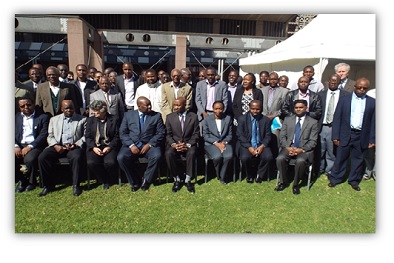The workshop provided a platform for stakeholders to address and share lessons on IUWM concepts and practices in different municipalities and towns in Zimbabwe. The workshop comes in a broader framework of GWP’s role in promoting IUWM, which is an innovative framework for interventions over the entire water cycle and a reconsideration of the way water is used (and reused).
The workshop deliberations paid a particular emphasis on Marondera, the 7th largest town in Zimbabwe, that is yet to receive adequate external support towards revamping its water supply and sanitation services. The objectives of the workshop thus entailed understanding the current state of the water supply, waste water, sanitation, storm water and solid waste services in urban areas of Zimbabwe with a particular focus on the city of Marondera.
The workshop was officially opened by Hon Saviour Kasukuwere, Minister of Environment, Water and Climate. Hon Kasukuwere noted that water as an economic and social value in all its competing uses should be allocated in an equitable manner, adopting pro poor approaches. He specifically mentioned that during the AWF’s Governing Council meeting held in November 2013, the government of Zimbabwe expressed interest of the “cities of the future” concept that encompasses IUWM principles which the AWF is pursuing with selected countries and partners.
Hon Saviour Kasukuwere also pointed out that the IUWM concept involves producing a master plan which not only service the current needs but also the future needs under severe stress from climate change. Such a plan looks at not only delivering traditional services but introduces holistic ideas where sewage is viewed not as a waste but a resource, and where sewage is transformed from being a nuisance to a national resource.
The Minister further encouraged everyone to grab the concept and run with it since it can result in a viable business model that can actually create new cash flows and job opportunities for Zimbabwe. He extended his gratitude to AfDB through the AWF and GWP for initiating such a project. Speaking during the same workshop was the Mrs, Maureen Ntege- Wasswa, representing AWF who spoke on the objectives of the African Development Bank (AfDB), Africa Water Facility (AWF) appraisal mission.
Mr, Mateus Magala, Resident Representative Zimbabwe country office of the AfDB Group in giving his remarks noted how the world today is experiencing challenges that are quite different to those faced by our predecessors and these include rapid urbanisation, ageing infrastructure, rapid population growth, inadequate planning, pollution, competing demands on water resources, and of course climate change. This he noted no longer affords us the luxury of carrying on with our “business as usual”. To address these challenges, he noted the need to maximise the potential and value of water and waste.
On elaborating on the AWF, Mr Magala noted AWF is an initiative of the African Ministers Council on Water (AMCOW) to mobilize and apply for resources for the development of Africa’s water sector. The AfDB manages and hosts the AWF. In 2009, the AWF extended a Euro 2 million grant to the Chitungwiza Municipality. The proposed intervention in Marondera would be the second grant from the AWF to Zimbabwe. He also encouraged all participants to support the required collaborative effort in making IUWM a reality in Zimbabwe. In his concluding remarks, he reiterated that the AfDB the AWF were both commitment to support the Republic of Zimbabwe in its efforts to improve the quality of life of its people.
Mr Shangwa Mavesera,Town Clerk, Bindura presenting on the drivers and pressures of urban WASH Services in Zimbabwe, noted the following; economic challenges resulting in reduced incomes and lack of credit lines, inappropriate technology, especially wastewater treatment, dependency on electricity, imported spares, institutional setting and HIV and Aids affecting family structures, productivity and health support. Going forward, Mr Mavesera, highlighted a new mind set based on risk-anticipation, rather than on assumptions and a sound business model that will attract private capital and improve project bankability.
Some other key stakeholders that attended included Ms Erica Jones, Principal Director Urban Local Authorities, who also gave remarks on behalf of the Ministry of Local Government, Public Works and National Housing. Professor Kala Vairavamoorthy, GWP Technical Committee, also gave a presentation on the concept of Integrated Water Resources Management.
By the end of the workshop, participants addressed the opportunities and constraints in using waste by-products as an income generation activity in Zimbabwe; Needs associated with implementing an integrated approach for urban water management in Zimbabwe; and mechanisms that can be used to improve inter-institutional and inter-sectoral dialogue and coordination at national and local levels.
